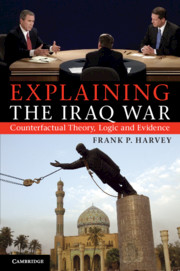‘Counterfactuals are too often rhetorical weapons of mass destruction rather than conceptual tools for parsing the logic of causal claims. Harvey brings much needed rigor to a particularly bitterly divisive what-if debate, that over the 2003 Bush administration's decision to invade Iraq.’
Philip E. Tetlock - Annenberg University Professor, University of Pennsylvania
‘A sophisticated use of counterfactuals to go beyond ideologically motivated explanations for the Iraq War. Harvey's method and its application will impress even those who are not persuaded by his argument that a Gore administration would also have gone to war.’
Richard Ned Lebow - James O. Freedman Presidential Professor, Dartmouth College
‘In a provocative study of the 2003 Iraq War, Harvey challenges standard interpretations that trace the origins of the war to the beliefs and personality of George W. Bush and to the influence of his neoconservative advisors. Not all readers will be convinced by Harvey's innovative use of counterfactual analysis to argue that international and domestic pressures would have also led Al Gore to a decision for war. But all subsequent analyses of the Iraq War must take this argument seriously.’
Jack S. Levy - Board of Governors' Professor, Rutgers University
‘Harvey serves up an interesting cocktail. He combines a provocative thesis about the relatively minor role of George Bush in the explanation of the 2003 Gulf War with one of the most methodologically sophisticated counterfactual analyses I have seen.’
Gary Goertz - University of Arizona
‘Frank P. Harvey has written a lucid, penetrating, and provocative account of the origins of the Iraq War. Regardless of where one stands on this controversial set of decisions, it is a must read.’
Janice Gross Stein - Director, Munk School of Global Affairs
'Using sophisticated counterfactual arguments, Frank Harvey presents an imaginative, bold, and provocative reinterpretation of the US-led invasion of Iraq in 2003. Basing his analysis on a wide variety of documentary sources and other empirical evidence, he carefully and methodically challenges, and dismantles, the standard explanations for the war that overwhelmingly locate causality within the administration of George W. Bush. This book not only makes an important contribution to our understanding of the 2003 war, a conflict whose effects continue to impact global politics; more importantly, it demonstrates how path dependence and counterfactual theorizing, rigorously and imaginatively applied, can enhance our understanding of international relations.'
Source: Canadian Political Science Association International Relations Book Prize 2013 Jury Report
'For this reviewer at least, the tightness of Harvey's argument, the extent of the evidence that he supplies, and the care and fastidiousness with which he presents his conclusions combine to produce a book that mercilessly assaults the notion that the responsibility for the 2003 war in Iraq falls squarely on the shoulders of Bush and the neocons, and on their misguided priorities and intentional deceptions … Harvey vigorously challenges an intellectual position that has become so enduring that it had achieved the status of a truth. And if this book does not, at a minimum, sow doubts in the minds of believers, then nothing will.'
Adeed Dawisha
Source: Perspectives on Politics
'Harvey's work is both commendable and welcome, and should lead to much soul-searching among the academy, policymakers, and interested citizens, not to mention this country's two million or so Iraq War veterans who are often told that they fought because of a war-mongering president. By eliminating 'Bush and the neocons' from the explanation of the Iraq War, Harvey re-centers attention on the factors that international relations theorists should have been focused on all along: US unipolarity and the effects of the 9/11 attacks … Airport bookshops may thrive on contingent accounts of history … But like them, the theory that George W. Bush caused the Iraq War represents an astonishing failure to show that changing one variable would make all other variables irrelevant. Harvey reminds us to take history, and politics that makes it, more seriously.'
Bruce Gilley
Source: Perspectives on Politics
'Frank Harvey has written a provocative and interesting book that admirably questions the conventional wisdom that Al Gore would not have initiated the Iraq War. His arguments raise often unacknowledged and untested assumptions about the counterfactual alternative of a Gore foreign policy after 9/11.'
Elizabeth Saunders
Source: Perspectives on Politics
'Earlier this summer, Canada’s political scientists chose as their top prize winner a book that provocatively refutes the dominant theory around one of the worst public policy disasters of the twenty-first century, the Iraq War … Counterfactual theory is a widely used tool for analyzing public accounts of historical events, or testing social science theories of causation. Here it is deployed with a rigour seldom seen before. Harvey uses counterfactual argument to advance that the answer is no, Al Gore in the White House would not have been enough to avoid war.'
Andrew Steele
Source: The Globe and Mail
'Frank Harvey’s award-winning book challenges the postwar prevailing wisdom on the second 2003 war and its aftermath … His book, while certainly very scholarly, is a major contribution to the understanding of events that still haunt us.'
Guy Pothier
Source: Frank Magazine



